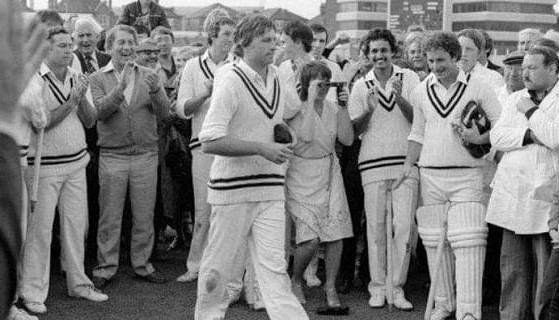When we think of Zimbabwe with regards to the 1983 World Cup, the only match that comes to our minds is the one where they reduced India for 17 for 5 and still lost the match, thanks to Kapil Dev’s incredible 175 not out.
But there is more to Zimbabwe in the 1983 World Cup than their dramatic defeat against India. What they achieved in the tournament is rare and, unfortunately for them, hardly spoken or written about.
Zimbabwe won the ICC Trophy in 1982 in England after defeating Bermuda in the finals and hence qualified for the 1983 World Cup that was played in the same country.
Zimbabwe’s first match was against a strong and established team like Australia at Trent Bridge on 9 June 1983. As they were to play their first ever international series, there were no hopes from them. It would have been good for them even if they gave a decent fight to the opposing team.
But they did much more than that.
Batting first, Zimbabwean openers Ali Shah and Grant Paterson gave them a good start but both were dismissed with the score being on 55. Captain Duncan Fletcher had his task cut out as one of the prominent batsman David Houghton was out for a golden duck at the score being 86 for 4.
But Fletcher played a true captain’s innings with an unbeaten 69 off just 84 balls and helped Zimbabwe reach 239 for 6 off their 60 overs.
Chasing 240 in 60 overs against minnows looked like an easy task. But Fletcher wasn’t done yet. He excelled with the ball as well and ensured that Zimbabwe won the match! Yes, the African country in their first ever match and that too against a test-playing team like Australia managed to win by 13 runs. This went down as the first ever upset in World Cup history.
In fact, this remains the only instance where an associate nation won its first ever ODI match against a test-playing nation.
Fletcher had figures of 4 for 42 from 11 overs. This coupled with his heroic innings with the bat rightfully earned him the man of the match award.
Strangely, Australia didn’t get all out. They lost by not being able to score 240 despite having 60 overs at their disposal. They lost their 7th wicket at the score of 176. Rodney Marsh and Rodney Hogg then scored 50 off 42 balls and 19 off 22 balls respectively and had a 50 run unbeaten stand. But that wasn’t enough as the damage was already done by the top order by scoring slow.
I am sure Zimbabweans would have been over-the-moon with the result. But unfortunately, there isn’t a single video available of this match anywhere on the internet.
Zimbabwe, however, couldn’t repeat this feat in the remaining five matches of the series, although they did put India in a state of panic in their infamous defeat. But the team slowly progressed from here on. In the 90s and early 2000s, they defeated India on few occasions, including the close encounter in the 1999 World Cup, and got them tensed in few other. They also got the test status in 1992.
Unfortunately, political turmoil gripped the African nation at the start of the new millennium. During their 2003 World Cup campaign, Grant Flower and Henry Olonga protested against their government by wearing black bands on their arms and that was the end of their career as well as Zimbabwe’s miniature dominance. Their national team has been trying to climb the ladder since years.
These days, they are playing as an associate nation and hoping for a comeback and, maybe, a few more upsets.
Also read:

amazing info. had no idea about this.
Thank you 🙂
Partially correct info mate.. Sri Lanka(which was an associate) beat India in 1979 WC which is also an upset. In Zimbabwe’s case, it’s major as 83 was their first WC.
It was Sri Lanka’s second World Cup. Zimbabwe is the only associate team to win their first ever match against a test playing nation in a World Cup. It also happens to be their very first World Cup match.